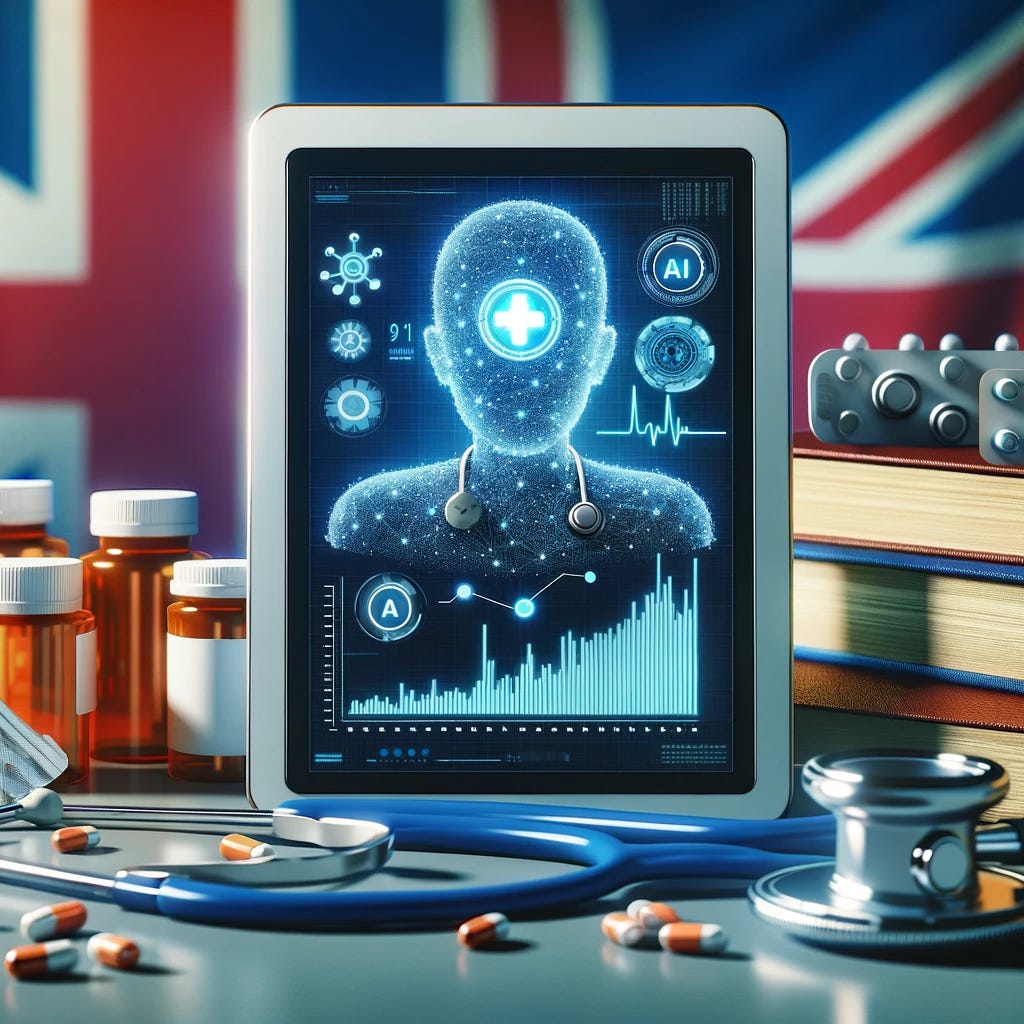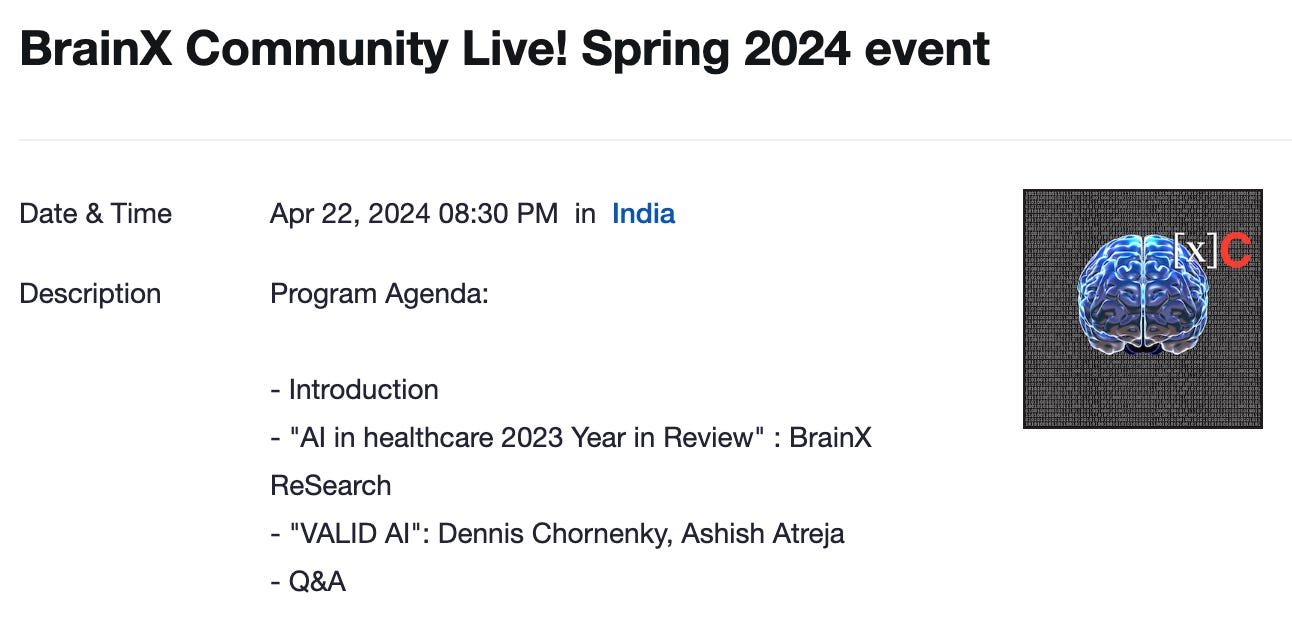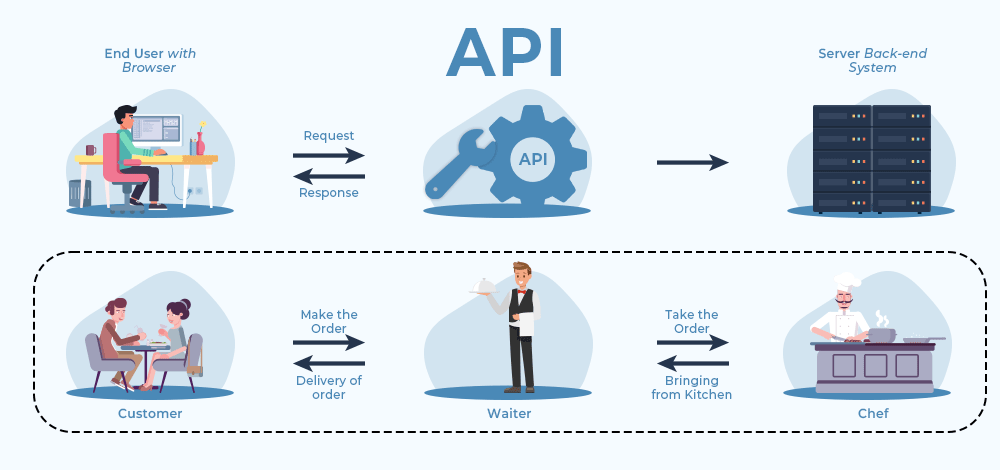🚀 Discover Med AI's Latest Milestones: Safer Prescriptions & Sepsis Prediction—Explore Now! 🏥
Updates on Artificial Intelligence & Emerging Technologies in Medicine 🤖🩺
“[Physicians] are going to look at you sideways if you ask them to align, but if you ask them to be the leaders and determine what the future will look like, they will rise to the challenge.” - Lucy Hammerberg, MD, chief quality officer of Northwest Community Hospital in Arlington Heights, Ill.
Dear Med AI Enthusiast,
Welcome to The ‘Med AI’ Capsule weekly newsletter, your inside look at how artificial intelligence and emerging technologies are transforming medicine.⚕
Whether you're a medical professional 👩⚕️, a technology enthusiast 💻, or simply someone with a curious mind 🧠, The 'Med AI' Capsule is designed for you.
It helps you stay informed 📰 about the latest groundbreaking updates and offers insights into the rapidly evolving world 🌍 of artificial intelligence and emerging technologies in medicine.
Let the adventure begin! I'm thrilled to have you along for the ride. 🚀
In today’s capsule:
3 News Updates (1 Deep Dive)
3 Research Updates (1 Deep Dive)
2 Innovative Companies (Industry Showcase)
2 Upcoming Events
1 Knowledge Resource
1 Concept Made Easy
Reading Time: 5-7 minutes
News Updates 📰
1. 💊 Oxford's AI Tool 'DrugGPT' Aims to Improve Medication Prescription Safety in England
In an effort to reduce the significant number of medication errors annually in England, Oxford University has developed a groundbreaking AI tool named DrugGPT. This innovative technology is designed to serve as a "safety net" for healthcare professionals, helping to prevent the 237 million medication errors reported each year across the country.
Why Important: Medication errors not only cause substantial financial loss—estimated at £98 million annually—but also pose serious health risks, contributing to over 1,700 deaths. DrugGPT aims to mitigate these risks by providing clinicians with instant feedback on prescriptions, including potential drug interactions and adverse effects, based on a patient’s specific conditions.
“One of the great things is that it then explains why. It will show you the guidance – the research, flowcharts and references – and why it recommends this particular drug.” - Prof. David Clifton
Caution: Despite the promising initial results, the creators stress the importance of keeping humans in the decision-making loop. Extensive piloting and validation are needed to ensure the tool's efficacy and safety before it sees broader use in healthcare settings.
2. 🔍 Prenosis Achieves FDA Nod for Innovative AI-Powered Early Sepsis Prediction Tool
The FDA has approved Prenosis' Sepsis ImmunoScore, the first AI/machine learning software as a medical device for diagnosing and predicting sepsis, which uses advanced AI to evaluate biomarkers and clinical data, significantly enhancing rapid and informed clinical decision-making.
Despite this technological breakthrough, maintaining human oversight in clinical decisions remains crucial to ensuring the highest levels of patient care are achieved.
3. 🫀 Nottingham Trent University Develops 3D Printed Heart and Lung Models That Bleed and Breathe
Researchers at Nottingham Trent University have developed innovative 3D printed heart and lung models that mimic real organ functions like bleeding, beating, and breathing, aimed at improving organ transplant training for medical professionals.
While these models provide a more realistic training experience, they should be used to complement, not replace, traditional methods using cadavers and animal organs, ensuring a balanced and thorough surgical education.
Research Updates 🔬
1. 🌐 Deep Learning Enhances Detection and Grading of Oral Epithelial Dysplasia in Oral Leukoplakia

Researchers have significantly advanced the detection and grading of oral epithelial dysplasia (OED) in oral leukoplakia through a novel deep learning model. This model, named E-MOD-plus, combines convolutional neural networks and logistic models to offer high accuracy and objectivity in diagnosing OED.
Key Findings:
High Accuracy: The model achieved a predictive accuracy of 86.5% and an area under the curve of 0.669, surpassing traditional methods.
Clinical Relevance: E-MOD-plus provides a more reproducible and less time-consuming method for grading oral epithelial dysplasia, potentially assisting pathologists significantly in clinical settings.
Limitations and Future Directions:
The study acknowledges the need for larger datasets and further validation to enhance the generalizability and robustness of the findings.
Future research aims to incorporate transfer learning to improve the model's performance further.
This pioneering work offers a promising direction for employing advanced computational methods in the early detection and precise grading of potentially malignant oral diseases, thereby enhancing patient care and diagnostic accuracy.
2. 🤖 Novel Machine Learning Model Predicts Hemodynamic Instability Post-Intubation
Researchers at Peking Union Medical College Hospital developed a machine learning model to predict post-intubation hemodynamic instability using data from over 23,000 patients, aiming to improve perioperative anesthesia safety and quality.
The Extra Tree Regression model excelled, demonstrating strong predictive accuracy and correlation with anesthetist assessments, though the study's reliance on data from a single source highlights the need for wider validation.
3. 🎓 ChatGPT Shows Potential for Enhancing Medical Education and Training for Doctors and Students
A study highlights how ChatGPT is transforming medical education, enhancing doctors' and medical students' clinical reasoning and decision-making through personalized tutoring and simulated interactions.
However, it also stresses the need for careful implementation and regulation to manage ethical concerns and maintain a balance between technological advancements and traditional educational practices.
Industry Showcase 👨🏭
Deepscribe - Ambient AI platform automates clinical documentation, allowing clinicians to save time and focus more on patient care by seamlessly integrating with existing EHR systems and enhancing the accuracy and efficiency of clinical notes. Additionally, it offers economic benefits by reducing documentation costs and improving provider utilization, as well as contributing to better work-life balance for clinicians through reduced documentation burden.
SigTuple - has democratized microscopy with innovative use of AI, robotics, and cloud computing. The SigTuple AI100, featuring Shonit™, is an AI-driven smart robotic microscope that has transformed pathology by replacing traditional manual microscopy with AI-assisted digital pathology, streamlining diagnoses to be faster, more accurate, and cost-effective.
Upcoming Events 🧑💻
Knowledge Resource 📚
YouTube Video: The future of AI in medicine by Conor Judge at TEDxGalway
This video explores the integration of artificial intelligence into healthcare. Dr. Judge discusses how AI can enhance medical diagnostics and treatment by handling diverse data types, such as images, text, and numerical data. He highlights specific AI applications, like the autonomous reporting of normal chest X-rays by Oxipit's ChestLink and the use of AI in ophthalmology to predict diseases like Parkinson's from retinal images.
Dr. Judge emphasizes the necessity of responsible AI implementation in medicine, addressing public trust and the importance of explainability and rigorous testing through randomized clinical trials. He envisions a future where AI complements the human aspects of medical practice, improving healthcare accessibility and efficiency worldwide, particularly in low-resource settings.
Let’s wrap it up with a ‘Concept Made Easy’! 👨🏫
Term/ Concept: API (Application Programming Interface) 🤖
An API in technology acts like a waiter in a restaurant, where it serves as the intermediary that allows your software to "order" specific tasks or information from another system, similar to how a waiter takes your order to the kitchen and brings back your food.
In AI, APIs facilitate the sending of requests (like placing an order), the processing of these requests (like cooking the meal), and the receiving of responses (like getting your order served).
They are crucial because they simplify the use of complex AI tools, enable connectivity between different software, and enhance efficiency by allowing access to AI features without the need for extensive development, effectively acting as a bridge that connects user requests to AI capabilities.
This makes APIs indispensable in the digital age, functioning like a magic genie that fulfills your technological requests effortlessly.
Your feedback is crucial to me, as it helps me understand your interests and improve my offerings. I would appreciate it if you could take a few minutes to share your thoughts about what you've enjoyed and what you think I could do better - https://forms.gle/xpbpgVEyARWx6ZxN8
Stay tuned for our upcoming editions as we explore the latest breakthroughs and dive deep into the transformative power of artificial intelligence and emerging technologies, shaping a healthier future. 🚀
Warm regards,









